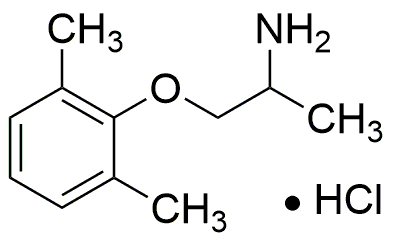Mexiletine hydrochloride is widely utilized in research focused on:
- Cardiac Arrhythmia Treatment: Primarily used to manage ventricular arrhythmias, providing an alternative for patients who may not respond well to other antiarrhythmic medications.
- Neuropathic Pain Management: Employed in clinical settings to alleviate chronic pain associated with conditions like diabetic neuropathy, offering a unique mechanism of action compared to traditional pain relievers.
- Research in Pharmacology: Used in studies to understand drug interactions and pharmacokinetics, helping researchers develop better therapeutic strategies for heart conditions.
- Veterinary Medicine: Sometimes prescribed for animals with similar cardiac issues, showcasing its versatility beyond human medicine.
- Formulation Development: In pharmaceutical research, it serves as a model compound for developing new formulations and delivery methods, aiding in the advancement of drug delivery technologies.
General Information
Properties
Safety and Regulations
Applications
Mexiletine hydrochloride is widely utilized in research focused on:
- Cardiac Arrhythmia Treatment: Primarily used to manage ventricular arrhythmias, providing an alternative for patients who may not respond well to other antiarrhythmic medications.
- Neuropathic Pain Management: Employed in clinical settings to alleviate chronic pain associated with conditions like diabetic neuropathy, offering a unique mechanism of action compared to traditional pain relievers.
- Research in Pharmacology: Used in studies to understand drug interactions and pharmacokinetics, helping researchers develop better therapeutic strategies for heart conditions.
- Veterinary Medicine: Sometimes prescribed for animals with similar cardiac issues, showcasing its versatility beyond human medicine.
- Formulation Development: In pharmaceutical research, it serves as a model compound for developing new formulations and delivery methods, aiding in the advancement of drug delivery technologies.
Documents
Safety Data Sheets (SDS)
The SDS provides comprehensive safety information on handling, storage, and disposal of the product.
Product Specification (PS)
The PS provides a comprehensive breakdown of the product’s properties, including chemical composition, physical state, purity, and storage requirements. It also details acceptable quality ranges and the product's intended applications.
Certificates of Analysis (COA)
Search for Certificates of Analysis (COA) by entering the products Lot Number. Lot and Batch Numbers can be found on a product’s label following the words ‘Lot’ or ‘Batch’.
*Catalog Number
*Lot Number
Certificates Of Origin (COO)
This COO confirms the country where the product was manufactured, and also details the materials and components used in it and whether it is derived from natural, synthetic, or other specific sources. This certificate may be required for customs, trade, and regulatory compliance.
*Catalog Number
*Lot Number
Safety Data Sheets (SDS)
The SDS provides comprehensive safety information on handling, storage, and disposal of the product.
DownloadProduct Specification (PS)
The PS provides a comprehensive breakdown of the product’s properties, including chemical composition, physical state, purity, and storage requirements. It also details acceptable quality ranges and the product's intended applications.
DownloadCertificates of Analysis (COA)
Search for Certificates of Analysis (COA) by entering the products Lot Number. Lot and Batch Numbers can be found on a product’s label following the words ‘Lot’ or ‘Batch’.
*Catalog Number
*Lot Number
Certificates Of Origin (COO)
This COO confirms the country where the product was manufactured, and also details the materials and components used in it and whether it is derived from natural, synthetic, or other specific sources. This certificate may be required for customs, trade, and regulatory compliance.


